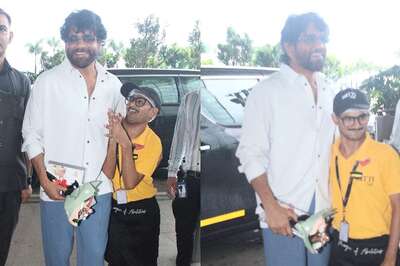
views
With a crucial Lok Sabha election less than three months away, the Congress is sending out confusing signals on how it plans to work with other opposition parties in achieving its larger objective of dethroning the Modi government.
Stepping out of a meeting of opposition leaders at Nationalist Congress Party leader Sharad Pawar’s residence on Wednesday, Congress president Rahul Gandhi echoed West Bengal chief minister Mamata Banerjee, who said they would all have a pre-poll alliance and work out a common minimum programme.
The meeting was also attended by senior National Conference leader Farooq Abdullah, Andhra Pradesh chief minister N.Chandrababu Naidu and Delhi chief minister Arvind Kejriwal.
At the same time, the Nehru-Gandhi scion clarified that while the opposition parties will work together at the national level, they will also compete with each other in the states. This was an obvious and clear indication of the prevailing fluid situation in Uttar Pradesh, West Bengal and Delhi, where the Congress is having problems with potential partners.
This has also revived an old internal debate in the grand old party about whether it should strengthen itself and maximise its gains or should it sacrifice its self-interest to build alliances for the specific purpose of unseating the Modi government.
Finding a balance between these two objectives is always a challenge. This was best exemplified by two incidents witnessed in Parliament in the last days of the session. When the opposition parties protested in the Rajya Sabha a day after the Yogi Adityanath government in Uttar Pradesh did not allow Samajwadi Party president Akhilesh Yadav to travel to Allahabad, the Congress did not join the rest.
This infuriated the Samajwadi Party leaders who felt this was symptomatic of the Congress party’s big brother attitude.
Within a day, the Congress also managed to anger Mamata Banerjee after Adhir Ranjan Chowdhary, a senior Congress leader from West Bengal, charged that the Trinamool Congress chief was involved in the Saradha chit fund scam while speaking in the Lok Sabha. Former Congress president Sonia Gandhi was present in the House when Chowdhury attacked the West Bengal chief minister.
An enraged Banerjee confronted Sonia Gandhi over this later, declaring that she would not forget this incident. The Congress leader responded, “We are accusing each other but we are friends.” However, an angry Banerjee kept muttering that she would ensure that Chowdhury was defeated in the elections long after Sonia Gandhi had left.
There was no official reaction by the Congress to these two seemingly minor incidents but party leaders informally remarked that they could not allow demanding allies to walk over them and that they had every right to protect their turf. The general refrain in the Congress was that in its eagerness to stitch up alliances, the party could not lose sight of the fact it also has to strengthen its organization.
On its part, the Congress is furious with the Trinamool Congress for poaching on its legislators and MPs in West Bengal. It is also upset with Mayawati and Akhilesh Yadav for going ahead with their alliance in Uttar Pradesh and leaving Amethi and Rae Bareli for their leaders which many described as an act of charity.
It is also finding it hard to forgive the two parties for not standing by their leaders when they were being hounded by the Modi government. The Congress has responded to the SP-BSP rebuff by bringing in Priyanka Gandhi Vadra and declaring bravely that it will contest all 80 seats in Uttar Pradesh on its own.
Though Banerjee put aside the Adhir Chowdhury incident and later announced that she was willing to work with the Congress and the Left parties at the national level to defeat the BJP, the two incidents provided a glimpse into the difficulties of implementing these decisions in the states where local rivalries are so well entrenched.
More importantly, they showed up the fragile and tenuous nature of relations between the Congress and its allies as even a minor incident has the potential to trigger an ego clash. This tug-of-war was a constant phenomenon when the Congress-led the United Progressive Alliance government was in power for two terms from 2004-20014.
When the Congress outsmarted the Bharatiya Janata Party and formed a government in Karnataka with the help of the Janata Dal (S) by sacrificing the chief minister’s post to the junior partner, it had sent out a strong message that the grand old party’s primary objective was to see that Narendra Modi does not return as Prime Minister in the 2019 general election.
However, the party’s victories in the three Hindi heartland states of Rajasthan, Madhya Pradesh, and Chhattisgarh clearly emboldened the Congress. The grand old party is convinced that its political fortunes are on the upswing and that it can now be more assertive with its allies. It attempted to do so in Uttar Pradesh when it demanded 20-odd seats as its share in the coming Lok Sabha election. It was promptly snubbed by the BSP and the SP.
In its zeal to demonstrate that it is a pan-India party with a national presence, the Congress cannot afford to forget that it is in no position to defeat the BJP on its own. The grand old party’s footprint is substantially reduced now and it has virtually nothing to show for itself in states like Bihar, Uttar Pradesh, West Bengal and Tamil Nadu.
(Author is a senior journalist. Views are personal)




















Comments
0 comment